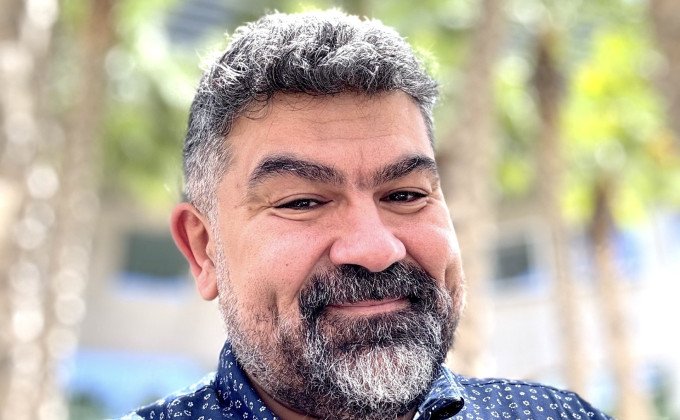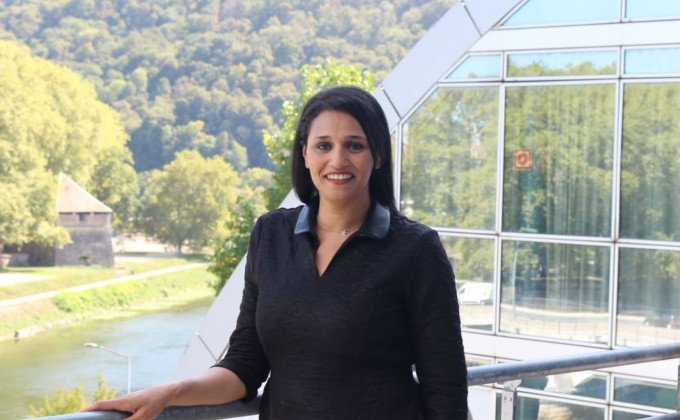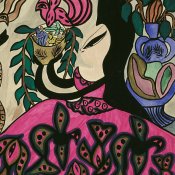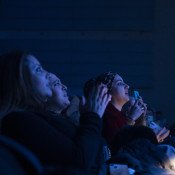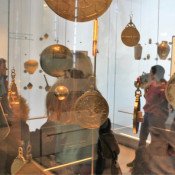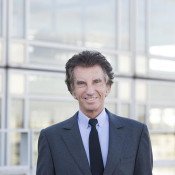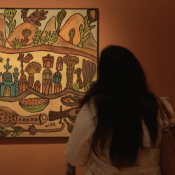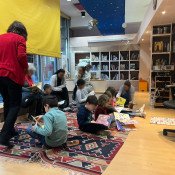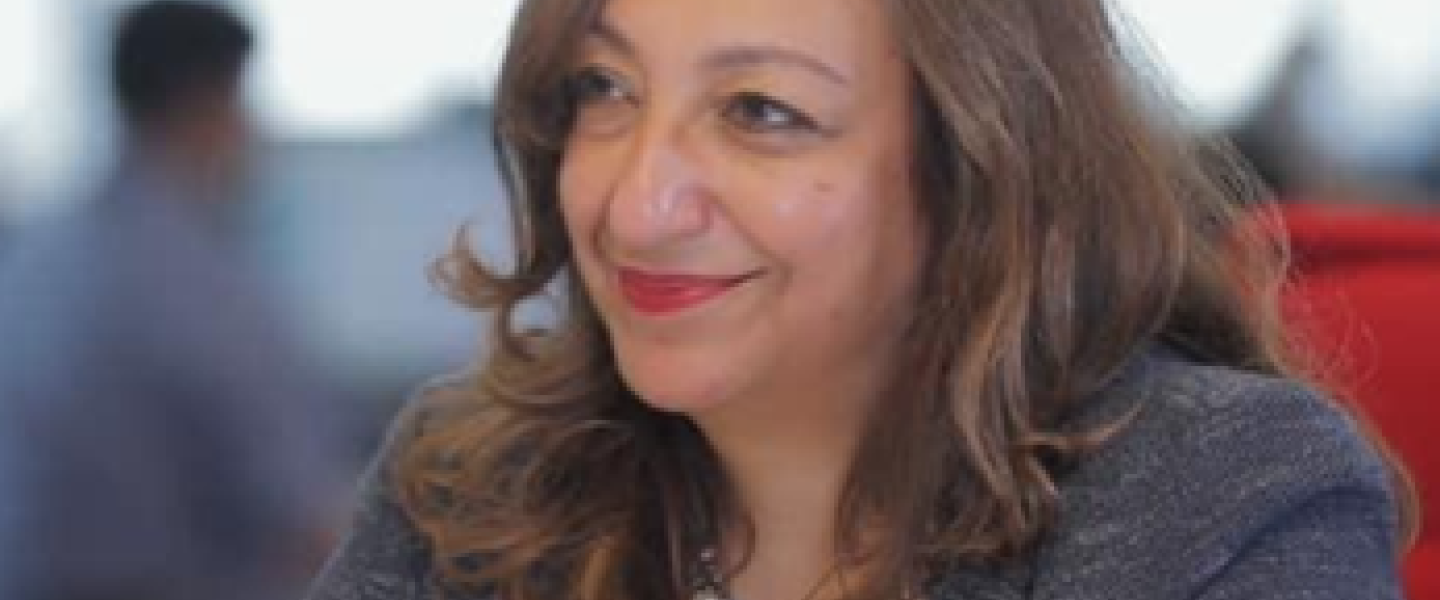
اللّغة العربيّة لغة الابتكار والتّقدّم
مقابلة مع حنان خليفة
مقابلة مع الدكتورة حنان خليفة، خبيرة في تعليم الّلغة العربية ستشاركنا في المدرسة الخريفيّة لتعليم اللّغة العربيّة الّتي ينظّمها مركز اللّغة والحضارة العربية لمعهد العالم العربي بين 21 و25 أكتوبر 2024.
(English version below)
(Version française plus bas)
د. حنان خليفة خبيرة رائدة في اختبارات اللغة والتقييم، وقد طورت امتحانات وطنية ودولية ووضعت مناهج واختبارات معيارية متوافقة مع الإطار الأوروبي المرجعي العام للغات. وعلى مدار عقدين من الزمن، قادت د. خليفة عمليات تطوير التعليم ودراسات الأثر في جامعة كامبريدج للنشر والتقييم للغة الإنجليزية، وقدمت استشارات لوزارات التعليم وهيئات الاختبارات في الشرق الأوسط وأوروبا وجنوب شرق أسيا وأمريكا الجنوبية. وتقود حالياً مبادرة عربية لتطوير مقياس الضاد لقياس القرائية وصعوبة النصوص برعاية شركة متا متريكس وألف للتعليم. وقد ساهمت كأكاديمية وخبيرة في المجلس الأوروبي في العديد من الأعمال الشهيرة، مثل النموذج الاجتماعي-المعرفي للقراءة (خليفة ووير 2009)، والمرفق الجديد للإطار الأوروبي المرجعي العام للغات (2018، 2020)، وإطار اللغة العربية لمدارس مؤسسة قطر (2022). فازت د. خليفة بعدة جوائز دولية، بما في ذلك جائزة الابتكار في التعليم الدولي (2013)، وجائزة العالمه المصرية الدولية في ٢٠١٩.
هل تطوير القياس والتّقويم أصعب في اللّغة العربيّة؟ هل هناك صعوبات معينة تقف بوجه التّقدم في هذا المجال؟
عند تطوير أيّ اختبار معياري يأخذ في الاعتبار 4 مبادئ أساسية: الصّلاحية، والموثوقيّة، والتّطبيق العملي، والتّأثير على العمليّة الدّراسيّة والمجتمع. وكذلك كيفيّة الموازنة بين هذه المبادئ أثناء مراحل إنشاء الاختبار وتنفيذه. وفي هذه الحالة، لا تختلف اللّغة العربية عن أي لغة أخرى. ولكن تطوير القياس والتّقويم في اللّغة العربية يمكن أن يواجه بعض التّحديات الفريدة، والتي قد تجعل العملية أكثر صعوبة مقارنة باللّغات الأخرى. من أبرز هذه التّحديّات أولّا، قلة الموارد اللّغوية المتاحة مقارنة باللّغات الأخرى مثل الإنجليزية. فقد تكون الموارد المتاحة للّغة العربيّة، مثل المعاجم الإلكترونية، والبيانات النّصية الكبيرة، وأدوات المعالجة اللّغوية الطبيعيّة، أكثر محدوديّة أو أقلّ تطوراً من غيرها من اللّغات وهذا قد يُعيق تطوير أدوات القياس والتّقويم الدّقيقة والشّاملة. ثانيًا، تفاوت اللّهجات المحليّة: وجود لهجات متعدّدة في العالم العربي يمثل تحدّياً إضافياً. فاللّهجات المحليّة المستخدمة في الحياة اليوميّة في وطننا العربيّ تختلف عن اللّغة العربية الفصحى والفصيحة وهذا يتطلب تطوير مقاييس قادرة على فهم وتقييم هذه اللّهجات بشكل دقيق. ثالثًا، نُدرة الأبحاث المتخصّصة في هذا المجال. على الرّغم من وجود تطور في هذا المجال، قد لا يكون البحث والتّطوير في القياس والتقويم في اللّغة العربية بنفس المستوى الذي وصلت إليه اللّغات الأخرى. ويرجع ذلك إلى عدة عوامل منها قلة برامج الماجستير والدّكتوراه المتخصّصة في بناء وصلاحيّة الاختبارات المعياريّة باللّغة العربيّة.
إنني أحلم أن تكون اللّغة العربيّة هي اللّغة الأكثر شيوعًا في العالم، وأطمح أن تكون اللّغة العربيّة لغة الابتكار والتّقدّم في مختلف المجالات وأن يشهد المحتوى الرّقمي العربي على الإنترنت نموًّا كبيرًا، مما يوفّر مصادر غنيّة ومتنوّعة للنّاطقين بالعربية، ولكل من يرغب في تعلّمها
كيف ترين مستقبل مجال قياس اللّغة العربية وما الذي تتمنيه للغة العربية؟
أراه مستقبلا واعدًا! فأنا متفائلة جدًّا بالجهود التي أراها قائمة الآن، وهي على سبيل المثال وليس الحصر: مبادرات مجمع الملك سلمان بالسّعودية، ومعهد العالم العربي بفرنسا، وتواجد موارد حديثة مثل "الإطار المرجعيّ اللّغة العربية لمؤسّسة قطر" للتّعليم في قطر، و"سامر" المعجم العربي المتدرج قرائيًّا في جامعة نيويورك في أبو ظبي. ولكن لتحقيق التّقدّم المطلوب فإنني أرى استخدام الذّكاء الاصطناعي والمعالجة الطبيعية للّغة سيساعدان في تطوير أدوات قادرة على تحليل النّصوص بشكل أعمق، وعلى إنشاء اختبار تكيُّفي مُحَوْسَب. كما أرى تطوير أدوات تقييم قادرة على قياس مستوى الفهم والاستخدام في اللّهجات المحليّة بالإضافة إلى اللّغة الفصيحة مما يعكس التّنوّع اللّغوي في العالم العربي. سيقام بتوفير برامج تدريبيّة للمعلّمين وكاتبي الأسئلة لتحسين قدراتهم على بناء واستخدام أدوات قياس بشكل فعّال ودقيق وأيضًا تشجيع المزيد من الدّراسات الأكاديميّة والبحوث التّطبيقيّة في مجال القياس والتّقويم للّغة العربيّة، بهدف تطوير نماذج تقييم تناسب جميع المستويات والمجالات.
أما عمّا أتمنّاه للّغة العربيّة... فإنني أحلم أن تكون اللّغة العربيّة هي اللّغة الأكثر شيوعًا في العالم، وأطمح أن تكون اللّغة العربيّة لغة الابتكار والتّقدّم في مختلف المجالات وأن يشهد المحتوى الرّقمي العربي على الإنترنت نموًّا كبيرًا، مما يوفّر مصادر غنيّة ومتنوّعة للنّاطقين بالعربية، ولكل من يرغب في تعلّمها. كما أتمنى الاستمرار في دعم المشاريع والمبادرات التي تهدف إلى الحفاظ على اللّغة العربيّة الفصيحة، وآمل من أولياء الأمور دعم استخدام اللّغة العربيّة كدعمهم للّغة الإنجليزية في الحياة اليوميّة والعمليّة. وأرجو أن يتم الحفاظ على الإرث اللّغوي العربي بكل لهجاته وتنوّعاته، مع تشجيع الابتكار في الأدب والشّعر والموسيقى والفنون باللّغة العربيّة. ولدي أمنيات أخرى، لكنني أكتفي بهذا القدر الآن.
هل يمكنك إخبارنا عن مشروع ميتاميتركس وألف للتّعليم؟ ما هي أهمية قيادة مشروع للدّول العربية كافة؟
شكرا لسؤالك، المشروع هو تعاون بين شركتي ميتاميتركس وشركة ألف للتّعليم في أبو ظبي. والمشروع الآن يطلق عليه اسم "مقياس الضّاد". مقياس الضاد ليس اختبارًا معياريًّا، ولكنه ميزان سيكومتري يلائم بين قدرة القارئ ومستوى صعوبة النّص. ورؤيتنا لهذا الميزان أنه ميزان عربي لا يخصّ دولة بعينيها ولهذا يتم عمل دراسة ميدانيّة على مستوى العالم العربي لفهم مستوى الطالب القرائي من الصّف الأول حتى الصّف الثّاني عشر وكذلك نقوم ببناء مدوّنة تجمع نصوصًا من جميع أنحاء الوطن العربي. كما أتشرّف بقيادة هذا العمل على مستوى الوطن العربي لأنّه عمل فريد من نوعه وسيحسّن من المستوى القرائي للطّالب، وسيُيَسّر على المعلّم وكاتبي الأسئلة اختيار النّصوص الملائمة لمستوى الطالب.
ماذا تقولين للقراء الذين يريدون المشاركة في المدرسة الخريفية؟ كيف تنظرين لمثل هذه اللّقاءات التي يقيمها معهد العالم العربي في باريس خلال الخريف؟
هذه هي المرة الأولى التي أتشرّف فيها بالمشاركة في المدرسة الخريفيّة، ولكن عند رؤية البرنامج ومعرفة المساهمين فيه، أرى أنها فرصة رائعة للتّعلّم والتّطوير الشّخصي والمهني. المدرسة الخريفية تجمع بين التّعلم الأكاديمي والخبرات العمليّة، ممّا يوفر بيئة مثالية لاكتساب معارف جديدة وتوسيع الآفاق. وكذلك تتيح لنا فرصة التّفاعل مع العديد من أهل الاختصاص والخبراء في مجالاتهم، والتّعرف على الحضور من خلفيّات متنوّعة والتّواصل معهم. أرى أن مثل هذه اللّقاءات ليست فقط لقاءات أكاديميّة، بل هي مساحة للابتكار والتّجديد وفرصة لتعزيز الهويّة العربيّة في عالمنا المتغيّر.
Arabic, a Language of Innovation and Progress
Interview with Hanan Khalifa, expert in language measurment and assessment. Hanan will be a speaker at the Autumn School of the IMA Language Centre dedicated to the didactics of the Arabic language. The Autumn School will be held from 21 to 25 October 2024.
Doctor Hanan Khalifa is a leading expert in language and measurement tests. She has developed national and international exams and developed standard curricula and tests in line with the CEFR. Over the course of two decades, she has lead projects at Cambridge University for benchmarking & baseline studies, institutional capacity building, assessment reform, curriculum reform, and was a consultant in ministries of education and testing bodies in the Middle East, Europe, Southeast Asia and South America. Doctor Hanan Khalifa is currently leading an Arab initiative to develop a metric of readability and text difficulty with MetaMetrics and Alef Education. She is also an academic and expert at the European Council. Doctor Khalifa has several international awards, including the Innovation in International Education Award (2013) and the Egyptian Scientists Worldwide Award in 2019.
Is the development of measurement and assessment more difficult in Arabic? Are there specific obstacles that stand in the way of progress in this field?
When developing any standard test, 4 basic principles are taken into account: validity, reliability, practicality, and influence on the study process and society. What also should be considered is balancing these principles during the stages of the test's establishment and implementation.
Arabic is no different from any other language; yet while developing measurement and evaluation in Arabic we can face some unique challenges which can make the process more difficult compared to other languages. One of the most prominent of these challenges is first, the lack of available linguistic resources compared to other languages such as English. The resources available for Arabic such as electronic lexicons, large text data and natural language processing tools may be more limited or less sophisticated compared to those in other languages. This may hinder the development of accurate and comprehensive measurement and evaluation tools. Second, the variability of local dialects: the presence of multiple dialects in the Arab world presents an additional challenge. Local dialects used in daily life in the Arab world are different from the classical or modern standard Arabic. This requires the development of measures capable of accurately understanding and evaluating these dialects. Third, the scarcity of research specializing in this field. Although there has been some progress, research and development in measurement and assessment of Arabic may not be at the same level as other languages. This is due to several factors, including the lack of master's and Ph.D. programmes specializing in the construction and validity of standard tests in Arabic.
I dream that Arabic will be the most popular language in the world, and I aspire that Arabic will be the language of innovation and progress in various fields and that Arab digital content on the Internet will grow considerably, providing rich and diverse sources for Arabic speakers and all those who want to learn it.
How do you see the future of Arabic measurement and what do you wish for Arabic?
I see it as a promising future. I am very optimistic about the efforts I see now, for example, the initiatives of King Salman's Global Academy in Saudi Arabia, the Arab World Institute in France, and the presence of modern resources such as the Arabic Language Reference Framework of Qatar Foundation for Education in Qatar, and the Arabic dictionary Samer at New York University in Abu Dhabi. To achieve the required progress, I see the use of artificial intelligence and natural language processing helping develop tools that can analyze texts more deeply and create an adaptive test. I also see the development of assessment tools measuring the level of understanding and use in local dialects as well as eloquent language reflecting the linguistic diversity of the Arabic World. Moreover I see training programmes for teachers and item writers improving their abilities to build and use measurement tools effectively and accurately, as well as to the promotion of further academic studies and applied research in measurement and assessment of Arabic, developing assessment models that fit all levels.
As for what I wish for Arabic... I dream that Arabic will be the most popular language in the world, and I aspire that Arabic will be the language of innovation and progress in various fields and that Arab digital content on the Internet will grow considerably, providing rich and diverse sources for Arabic speakers and all those who want to learn it. I also wish to continue to support projects and initiatives aimed at preserving the eloquent Arabic language, and I hope that parents will support the use of Arabic as much as they support the use of English in their everyday lives. I hope that the Arab linguistic heritage will be preserved in all its accents and diversity, while encouraging innovation in Arabic language literature, poetry, music and the arts. I have other wishes, but let’s stick to those first.
Can you tell us more about MetaMetrics and Alef Education? What is the importance of leading a project for all Arab countries?
Thank for your question! The project is a collaboration between MetaMetrics and Alef Education in Abu Dhabi, it is called the "Miqyas Al Dhad". Miqyas Al Dhad is not a standard test but a psychometric grading that fits the reader's competence and the level of text difficulty. Our vision for this grading is for it not to be associated to one country specifically. Therefore, a field study is being carried out in the Arab world to understand the level of students from the first to the twelfth grades. We are also building a corpus that collects texts from all Arab countries. I am honored to be leading this work; it is unique and will improve the reading level of all students, just as it will make it easier for teachers and item writers to choose texts according to the students’ level.
What do you say to our readers who want to participate to the Autumn School? What do you think about such meetings?
This is the first time I will be participating to the Autumn School. When I saw the program and who the other guest speakers where, I saw it as a great opportunity for personal and professional learning and development. The Autumn School combines academic learning with practical experiences, providing an ideal environment for gaining new knowledge and expanding prospects. It also gives us the opportunity to interact with and communicate with many specialists and experts in their fields. I believe that such meetings are not only academic meetings, but they are also a space for innovation and renewal and an opportunity to strengthen our Arab identity in this changing world.
L’arabe, langue d’innovation et de progrès
Entretien avec Hanan Khalifa, spécialiste en évaluation et certification. Hanan sera l'une des conférencières de la 2e édition de l’Ecole d’automne du Centre de langue de l’IMA dédiée à la didactique de la langue arabe, qui se tiendra du 21 au 25 octobre 2024.
Hanan Khalifa est une spécialiste de premier plan en matière de tests de langue et de certification. On lui doit l'élaboration d'examens nationaux et internationaux et la mise au point de programmes et de tests standard conformes au CECRL. Au cours des deux dernières décennies, elle a dirigé différents projets à l’Université de Cambridge portant sur les tests de performance, le développement des compétences, la réforme de l’évaluation, des programmes d'étude…, et a exercé en tant que consultante auprès de ministères de l’Education et d'organismes d’examen au Moyen-Orient, en Europe, en Asie du Sud-Est et en Amérique du Sud.
Parallèlement à sa carrière universitaire, Hanan Khalifa dirige actuellement une initiative arabe consacrée au développement d'un indicateur de lisibilité et de difficulté du texte avec MetaMetrics et Alef Education; elle est également experte auprès du Conseil européen. Elle a reçu plusieurs prix internationaux, dont le Prix de l’innovation dans l’éducation internationale (2013) et le Prix mondial des scientifiques égyptiens (2019).
La certification et l’évaluation sont-elles plus difficiles à mettre sur pied pour l'arabe que pour d'autres langues ? Existe-t-il des obstacles spécifiques ?
Lors de l’élaboration d’un test standard, quatre principes fondamentaux doivent être pris en compte : la validité, la fiabilité, l'aspect pratique et l’influence sur le processus d’étude et la société. Il faut également tenir compte de l’équilibre entre ces principes au cours des étapes d’établissement et de mise en œuvre du test. L’arabe est une langue comme les autres ; néanmoins, en développant la certification et l’évaluation en arabe, nous sommes amenés à faire face à des défis qui peuvent rendre le processus plus difficile. L’un des plus importants est le manque de ressources linguistiques disponibles, en comparaison d’autres langues comme l’anglais : les lexiques électroniques, les grands fichiers texte et les outils de traitement du langage naturel sont peut-être plus limités ou moins sophistiqués, ce qui peut entraver la mise au point d’outils de certification et d’évaluation précis et complets.
Deuxième défi à relever, la multitude de dialectes pratiqués dans le monde arabe. Ceux qui sont utilisés dans la vie quotidienne diffèrent de l’arabe classique ou moderne standard, ce qui rend nécessaire le développement de mesures à même de comprendre et d’évalue ces dialectes avec précision. Troisième défi, la rareté des recherches spécialisées dans ce domaine. Des progrès ont été accomplis, mais la recherche et le développement dans la certification et l’évaluation de l’arabe ne sont pas au même niveau que pour les autres langues. En cause, différents facteurs, dont le manque de programmes de master et de doctorat spécialisés dans l'élaboration de tests standard en arabe.
Je rêve que l'arabe devienne la langue la plus populaire au monde, une langue de l’innovation et du progrès dans des domaines variés, et qu'Internet propose de plus en plus de contenus en langue arabe, afin de fournir des ressources riches et diversifiées aux arabophones et à ceux qui veulent apprendre la langue.
Comment voyez-vous l’avenir de la certification en arabe, et que souhaitez-vous pour la langue arabe ?
Je vois un avenir prometteur ! Il n'est que de constater les initiatives qui se développent un peu partout, comme celles de l’Académie mondiale du roi Salman en Arabie saoudite et celle de l’Institut du monde arabe en France, la présence de ressources modernes telles que le Cadre de référence en langue arabe de la Fondation du Qatar pour l’éducation au Qatar, le dictionnaire arabe Samer à l’Université de New York à Abu Dhabi… Et pour accomplir les progrès nécessaires, l’intelligence artificielle et le traitement du langage naturel vont aider au développement d'outils capables d’analyser les textes plus en profondeur et de créer des tests adaptatifs.
Je prévois également que vont se développer des outils d’évaluation adaptés aux dialectes locaux – ce qui permettra de refléter la diversité linguistique du monde arabe –, et davantage de programmes de formation destinés aux enseignants et aux rédacteurs d’items. Je pense que davantage de gens opteront, à l'université, pour la recherche appliquée dans la certification et l’évaluation de l’arabe afin de développer des modèles d’évaluation qui s’adaptent à tous les niveaux.
Quant à ce que je souhaite pour l’arabe... Je rêve qu'elle devienne la langue la plus populaire au monde, une langue de l’innovation et du progrès dans des domaines variés, et qu'Internet propose de plus en plus de contenus en langue arabe, afin de fournir des ressources riches et diversifiées aux arabophones et à ceux qui veulent apprendre la langue. Je souhaite également continuer à soutenir des projets et des initiatives visant à préserver l'arabe classique, et j’espère que les parents encourageront l’utilisation de l’arabe autant qu’ils encouragent l’utilisation de l’anglais dans leur vie quotidienne. J’espère que le patrimoine linguistique arabe sera préservé dans tous ses accents et sa diversité, tout en encourageant l’innovation dans la littérature, la poésie, la musique et les arts de langue arabe. J’ai d’autres souhaits, mais restons-en là pour le moment !
Pouvez-vous nous en dire plus sur MetaMetrics et Alef Education ?
Merci pour votre question ! Ce projet, appelé « Miqyas Al Dhad », est une collaboration entre MetaMetrics et Alef Education à Abu Dhabi. Il ne s'agit pas d'un test standard, mais d'un calibrage psychométrique qui correspond à la compétence du lecteur et au niveau de difficulté du texte. Notre souhait et que ce calibrage ne soit pas associé à un pays particulier. Aussi, une étude de terrain est en cours à travers le monde arabe pour estimer le niveau des élèves, du début du primaire à la terminale. Nous sommes également en train de construire un corpus qui rassemble des textes de tous les pays arabes. J’ai l’honneur de diriger ce travail unique qui améliorera le niveau de lecture de tous les élèves, tout comme il rendra plus facile aux enseignants et aux rédacteurs d’articles la tâche de choisir des textes en fonction du niveau des élèves.
Que dites-vous à ceux de nos lecteurs qui projettent de participer à l’École d’automne ? Que pensez-vous de cette rencontre ?
Ce sera ma première participation à l’École d’automne. A la vue du programme et des noms des autres conférenciers invités, il m'a semblé que c'était là une excellente occasion d’apprentissage et de perfectionnement personnel et professionnel : l’École d’automne combine l’apprentissage académique avec des expériences pratiques, offrant un environnement idéal pour acquérir de nouvelles connaissances et élargir les perspectives. Elle nous donne également l’occasion d’interagir et de communiquer avec de nombreux spécialistes et experts dans leurs domaines. Bien plus qu'une série de rencontres académiques, l'École d’automne est aussi un espace d’innovation et de renouveau et une occasion de renforcer notre identité arabe dans ce monde en perpétuelle mutation.


